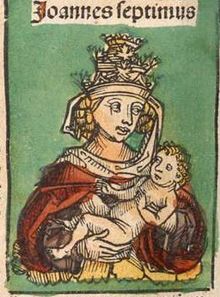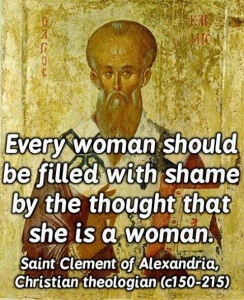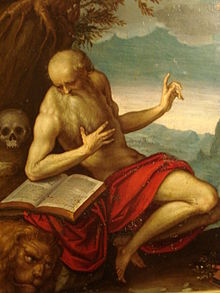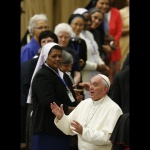In the comments section of my last post I wrote:
The relative power of women in the early Catholic Church is something that they like to keep quiet nowadays. There’s the obvious argument that if women could be priests and bishops 1,700 years ago and much closer to the time of Christ when the Church was purer, why can’t they now?
However, it looks like the pope, partly at least, is going to make a liar of me. According to the National Catholic Reporter:
Pope Francis has announced he will create a commission to study the possibility of allowing women to serve as deacons in the Catholic church …
That’s good news for women in Catholicism. Pope Francis apparently uses the phrase “feminine genius” with frequency when talking about what women do for the Church, and at a meeting last week he was challenged by women religious to put some action behind it.
The aforementioned 75-minute meeting was held at the Vatican last Thursday between the pope and nine hundred women religious. That’s hardly a setting designed to get decisions made, but the women had some good questions prepared for him regarding their role. The National Catholic Reporter described the exchange that led to the announcement:
Pope Francis gestures during an audience with the heads of women’s religious orders in Paul VI hall at the Vatican 12 May 2016. (Source: CNS/Paul Haring via National Catholic Reporter)
The women religious, meeting with the pope as part of the triennial assembly of the International Union of Superiors General (UISG), told Francis that women had served as deacons in the early church and asked: “Why not construct an official commission that might study the question?”
The pope responded that he had spoken about the matter once some years ago with a “good, wise professor” who had studied the use of female deacons in the early centuries of the church. Francis said it remained unclear to him what role such deacons had.
“What were these female deacons?” the pontiff recalled asking the professor. “Did they have ordination or no?”
“It was a bit obscure,” said Francis. “What was the role of the deaconess in that time?”
“Constituting an official commission that might study the question?” the pontiff asked aloud. “I believe yes. It would do good for the church to clarify this point. I am in agreement. I will speak to do something like this.”
“I accept,” the pope said later. “It seems useful to me to have a commission that would clarify this well.”
Francis’ openness to studying the possibility of women serving as deacons could represent an historic shift for the global Catholic church, which does not ordain women as clergy.
The reporter, Joshua McElwee, clearly has a better knowledge of Church history than the pope though, or at least better than the pope is prepared to admit. His report continues:
Many church historians have said however that there is abundant evidence that women served as deacons in the early centuries of the church. The apostle Paul mentions such a woman, Phoebe, in his letter to the Romans.
There is a lot more than that. In fact, it is simply impossible to write the history of early Christianity without heavy reference to women. The household churches that were set up by Paul in his wanderings were almost all headed by women. Some of those named by Dr Catherine Kroeger in her article The Neglected History of Women in the Early Church are “… Priscilla, Chloe, Lydia, Apphia, Nympha, the mother of John and Mark, and possibly the “elect lady” of John’s second epistle.”
Dr Kroeger sets out the extensive evidence for the formal involvement of women in the early Church. These sources are both Christian and non-Christian, written and artistic. For example, the walls of the Roman catacombs include depictions of early Christian ceremonies which are clearly being conducted by women. The work of the Council of Chalcedon (451 CE) included the formulation of rules for the ordination of female deacons and an ordination prayer for them is in the Apostolic Constitutions. There is no doubt that women were held ordained positions in the early Church, and it’s clear from documents of the time what their role was.

Pope John VII/Pope Joan from Hartmann Schedel’s religious Nuremberg Chronicle, published in 1493. (Source: Wikipedia)
There’s even a report that an early medieval pope was a woman, though she got the role not as a woman but by disguising herself as a man. Whether her story is legend or real is not known, though if an independent historian was allowed access to Vatican archives the matter could probably be finally settled.
She was supposedly born in Mainz in the 9th century, then a small town just west of Frankfurt, Germany. She entered the Church disguised as a man to follow her lover but her abilities saw her rise through the ranks. Eventually that saw her being elected Pope John VII. The legend says she was discovered when she went into labour during a procession and died soon after. Some stories say her death was due to natural causes and others that she was murdered to silence her and protect the reputation of the Church. Her name was then supposedly removed from official lists and the Church devised a ritual to ensure all future popes were male.
The fact of her existence was generally accepted until the 16th century, but then began to be disputed by theologians and historians. One of the main problems is that the first reports of her existence in publicly extant manuscripts isn’t until the thirteenth century, so that casts doubt on whether she really lived. Since the 16th century, the general consensus has thus been that she’s a legend.
Joshua McElwee’s report in the National Catholic Reporter goes on to describe how:
Pope John Paul II claimed in his 1994 apostolic letter Ordinatio Sacerdotalis that “the Church has no authority whatsoever” to ordain woman as priests, citing Jesus’ choosing of only men to serve as his twelve apostles.
Kroeger (writing in 1988) makes mincemeat of this claim of the idea that only men were apostles. She points out that Mary of Magdalene was spoken of as an “apostle to the apostles.” That is, she advised them in their role as apostles. Kroeger writes of the continuing tradition of female apostles too:
In the 2nd century, Clement of Alexandria wrote that the apostles were accompanied on their missionary journeys by women who were not marriage partners, but colleagues, “that they might be their fellow-ministers in dealing with housewives. It was through them that the Lord’s teaching penetrated also the women’s quarters without any scandal being aroused. We also know the directions about women deacons which are given by the noble Paul in his letter to Timothy.”
Was that perhaps the role of Junia? She was mentioned by Paul in Romans 16 as “of note among the apostles.” Some have debated the meaning of this verse, but early tradition holds that Junia was a woman and was considered an apostle. John Chrysostom wrote: “Indeed, to be an apostle at all is a great thing; but to be even amongst those of note; just consider what a great encomium that is … Oh, how great is the devotion of this woman, that she should even be counted worthy of the appellation of apostle.”
Until the Middle Ages, the identity of Junia as a female apostle was unquestioned. Later translators attempted to change the gender by changing the name to the masculine Junias. But such a name is unknown in antiquity; and there is absolutely no literary, epigraphical or papyrological evidence for it.
 This sort of thing happened over and over again in the Roman Catholic Church – the role of women was denied and diminished consistently and continually until it was as if it never happened. Women, as even Pope Francis says, do the “… work of servitude and not service.” There are also the multiple things I’m not even going to touch on in this post like the accusations of witchcraft, the double standards relating to sexual behaviour, and their appalling teachings in relation to contraception. At the same time as women were noted as being key to the dissemination of Christianity by people like Clement of Alexandria, he was saying things like that in the picture to the right. So he was no fan of women, and cannot be accused of playing up their role. The following is also attributed to him:
This sort of thing happened over and over again in the Roman Catholic Church – the role of women was denied and diminished consistently and continually until it was as if it never happened. Women, as even Pope Francis says, do the “… work of servitude and not service.” There are also the multiple things I’m not even going to touch on in this post like the accusations of witchcraft, the double standards relating to sexual behaviour, and their appalling teachings in relation to contraception. At the same time as women were noted as being key to the dissemination of Christianity by people like Clement of Alexandria, he was saying things like that in the picture to the right. So he was no fan of women, and cannot be accused of playing up their role. The following is also attributed to him:
In pain shall you bring forth children, woman, and you shall turn to your husband and he shall rule over you. And do you not know that you are Eve? God’s sentence hangs still over all your sex and His punishment weighs down upon you. You are the devil’s gateway; you are she who first violated the forbidden tree and broke the law of God. It was you who coaxed your way around him whom the devil had not the force to attack. With what ease you shattered that image of God: Man! Because of the death you merited, even the Son of God had to die … Woman, you are the gate to hell.
And he wasn’t the worst. While St Augustine was admitting in the early 400s “… that ‘any old Christian woman’ was better educated in spiritual matters than many a philosopher,” [Kroeger] he also said:
Woman was merely man’s helpmate, a function which pertains to her alone. She is not the image of God but as far as man is concerned, he is by himself the image of God.
(See 20 Vile Quotes Against Women By Religious Leaders From St Augustine to Pat Robertson by Valerie Tarico for more.)
 In my opinion, because it was interpreted by men, the story of Adam and Eve was one that convinced them that women were The Problem. God created the Garden of Eden, planting a tree with fruit that Adam was forbidden to eat. Eve was persuaded to eat that fruit by a talking snake, and she persuaded Adam. Humankind was thus banned from the Garden and for eternity. This situation was all blamed on Eve and by extension, all women. The fact that the tree was placed there by a god who was omniscient, therefore knew what would happen, and thus this was all part of his plan and his fault was conveniently ignored. Also ignored was the weakness of Adam in allowing himself to be persuaded. Of course, interpreting the myth as anti-women also allowed those in power to justify their actions as divinely decreed.
In my opinion, because it was interpreted by men, the story of Adam and Eve was one that convinced them that women were The Problem. God created the Garden of Eden, planting a tree with fruit that Adam was forbidden to eat. Eve was persuaded to eat that fruit by a talking snake, and she persuaded Adam. Humankind was thus banned from the Garden and for eternity. This situation was all blamed on Eve and by extension, all women. The fact that the tree was placed there by a god who was omniscient, therefore knew what would happen, and thus this was all part of his plan and his fault was conveniently ignored. Also ignored was the weakness of Adam in allowing himself to be persuaded. Of course, interpreting the myth as anti-women also allowed those in power to justify their actions as divinely decreed.
One of the early Church leaders that has had the most influence on the treatment on women is St Jerome (c. 347 – 420 CE) who translated most of the Bible into Latin (the version known as the Vulgate). From that time his was the only version of the Bible used in Western Christendom for over a thousand years. Even when it finally began to be translated into the vernacular, his translation was still used as a source for translation even though it wasn’t the original. The problem with this is that Jerome is one of history’s greatest misogynists, and he deliberately mistranslated parts of the Bible to make it seem like God had decreed women to be even more under the power of men than the original passages. This of course became known but nothing was about it because it was considered Jerome was inspired by God in his work and therefore the alterations should remain. I think it also suited the Men In Charge.

St Jerome by Jacopo Palma il Giovane (Source: Wikipedia)
Jerome was a pretty disturbed character. In his early life he was the typical student hedonist, but afterwards was always troubled by bouts of crippling guilt. An illness eventually drove him towards a celibate and ascetic life and he managed to attract a small group of patrician women to him to live a similar life. One young women, Blaesilla, died just a few months after starting to follow his instructions re asceticism, probably of malnutrition. Jerome said mourning Blaesilla was indulging in excessive feminine emotion, to the outrage of Roman society.
Jerome and some companions left Rome for Antioch in 385 to pursue their ascetic lifestyle. Some of the women followed them soon after. He was thrilled when any of the women starved themselves to the point that they stopped menstruating – they had thus improved themselves by making their bodies “more like a man’s.” He also thought babies were disgusting because they “shit all over you,” and complained of being tortured by dreams of dancing girls. There are many such examples is his writing as young women who had vowed to pursue the life of celibacy and asceticism he recommended frequently wrote to him for advice, and he replied.
The Roman Catholic Church has spent centuries forcing women into a second-class position, justified by a book of myths. They’ve made many women believe that the way they are treated is their lot in life, and to even dream for anything more or just different is to go against God’s Will and risk their heavenly reward. Thus many have never had the opportunity to pursue even the simplest of dreams. Let’s hope this papal commission is a step towards women one day getting equality, though that’s always going to be difficult when you still devote yourself to a god.
Update: 17 May 2016
It looks like the Vatican is already backing away from the pope’s comments. Reuters reports the following:
The Vatican played down on Friday expectations that Pope Francis might be ready to ordain women as deacons after he had raised hopes among liberal Catholics by promising to set up a commission to study the issue.
Deacons are ordained clerics who sit just behind priests in the Church hierarchy. They can officiate at baptisms, funerals and weddings, but are not allowed to celebrate Mass, hear confessions or anoint the sick. …
The Vatican played down on Friday expectations that Pope Francis might be ready to ordain women as deacons after he had raised hopes among liberal Catholics by promising to set up a commission to study the issue.
Deacons are ordained clerics who sit just behind priests in the Church hierarchy. They can officiate at baptisms, funerals and weddings, but are not allowed to celebrate Mass, hear confessions or anoint the sick. …
Conservative Catholics would certainly put up fierce resistance to any such a move, eager to preserve clear and separate roles for men and women within the Church.
After his election in 2013, Pope Francis swiftly ruled out ordaining women priests. However, he stirred concern among traditionally minded Catholics over what they perceive as his liberal leanings on a range of other issues, from divorce to the use of contraception.
Earlier this year, he overturned centuries of tradition that banned women from a foot-washing service during Lent, upsetting conservatives and delighting women’s rights activists.
Church liberals had hailed his call for a commission to look into the question of deacons.
“I can’t underscore enough how groundbreaking this is for the Church,” said Father James Bretzke, Professor of Moral Theology at the Boston College School of Theology and Ministry.
“It’s clear that Pope Francis, I believe, is trying to move towards institutionalizing a greater leadership and service role for women in the Church,” he added in emailed comments.
The Vatican did not say when the promised commission would be set up or what it would be asked to do.
With the election of the previous pope, Benedict XVI, the conservative faction thought they’d won control of the Vatican. Pope Francis is of the liberal faction and has been clearing the worst of the conservatives out of the key roles they hold. However, it may be that women deacons is a step too far. We’ll have to wait and see.


Interesting. I didn’t know there was such a history of women serving in the church. But then, I was raised a Catholic.
I note that the quoted commentary is that the Pope’s commission will study the possibility of allowing women to serve again, but the Pope’s own quotes are only that it would be good to clarify the role female deacons had in the early church. Either is a step in the right direction, but the former a much greater one than the latter.
Yeah, it’s not much of a step, but it is a step. “A journey of a thousand miles starts with a single step.” I see it as pretty significant that he’s even admitting there may be something to study – it’s a big departure from what previous Infallible Ones have stated.
Fascinating info, Heather. I believe a RC Deacon is distinctly inferiror to a priest, so even if this reform comes about, which as Ken points out is far from accomplished, it will be no more than a small step towards equality.
I know that early church “fathers” courted rich women, and these women played a significant role in smoothing the way for Christianity’s triumph over Roman polytheism among the populace. But Paul early on clarified the woman’s role in the Christian Church: “34 Let your women keep silent in the churches, for they are not permitted to speak; but they are to be submissive, as the law also says. 35 And if they want to learn something, let them ask their own husbands at home; for it is shameful for women to speak in church.” 1 Corinthians 14
Yeah, deacons are less than priests. In the early church baptism was done naked and people were fully immersed in holy water, so the baptism of women was a big role for female deacons. There seems to have been a differentiation between younger women, who did the more physical stuff, and the older ones also. Male deacons in the Catholic church have to be 35 and married, and I assume the same criteria will apply to women if they get the job. The role was re-instituted fairly recently, I assume to make up for the drop off in the number of priests.
There is convincing and plentiful evidence of female priests and bishops too though. It was such evidence that Protestant scholars relied on when they instituted similar roles in some of their denominations.
As for Paul, he was a prick. He relied totally on women for his work. They financed him completely, and without them Christianity wouldn’t have got off the ground. I guess I could be generous and say he’d internalized the same attitude toward women that was common amongst Christian theologians – that man’s fall was all women’s fault – but I’m really not inclined to do so. The Jesus person they made up treated women pretty well compared to the later Christian Church, and so he should have been less of a hypocrite.
Religion and misogyny seem to go hand in hand. Great article.
They sure do. I see religion as a useful justification for the oppression of whatever group you want power over. The main remaining one is women, but it’s been used for all sorts over the millennia.
Thanks for your kinds words. 🙂
Reuters has published an article called Vatican plays down expectations over women as deacons in Church. I’ve added an update to my post, which includes most of the article, as a result.
You can also seen the article here:
http://uk.reuters.com/article/uk-pope-women-idUKKCN0Y420O
These words from the current Pope re his willingness to consider the possibility of deaconesses in the Church and the subsequent disclaimer by “the Vatican” is part of the MO of Vatican politics these days re reform: the Big Tease and Con. This allows Pope Francis to play his humble, earnest, endearing, well-meaning, bit of a bumbling reformer role; then a mouthpiece for that amorphous entity called “the Vatican” steps in to do the walk-back and take the heat off him. This admirably preserves his public image as a pope of the people, and appeases and encourages his naïve fans (Catholic and non-Catholic alike), eager for ecumenism and progressive reform, to cling mightily to the theological virtue of Hope, while nothing at all is accomplished, or perhaps a crumb is tossed. He also speaks directly out of both sides of his mouth: out of one side come expressions of liberal, even progressive, desires for change; while out of the other emanates the usual offensive, reactionary crap (ex. as noted in this post: ‘Women, as even Pope Francis says, do the “… work of servitude and not service”’ and his comments about homosexuality) which reveal what the state of affairs really is – what one hears depends on which side of his mouth one is standing adjacent to; which again allows him to preserve and burnish his good-guy image and, as if he’s just a figurehead, blame everything on the big, bad Vatican bureaucracy, which is beholden only to itself.
Irrespective of questions of papal infallibility, I sincerely believe that if Pope Francis was committed to radically liberal changes in the Church, he could do it, though perhaps I’m as naïve as I accuse Pope Francis’s fans to be. Moving into ‘humble’ quarters and all that, visiting refugee camps and rescuing a few people, even washing the feet of the poor, are merely symbolic acts, and, given objective reality, I see nothing substantive in these particular symbolic acts any more than the odious Mother Teresa’s symbolic posturing was a reflection of any inherent holiness and humility that she possessed. In point of fact, I find the ritual of washing the feet of the poor particularly offensive, precisely because it’s a ritual, which, to me, reinforces rather than breaks down the divide between the haves and the have nots, and encourages the kind of demeaning and actually destructive pathological altruism that sadly infects and corrupts wide swaths of the (US and British) social welfare system and so many charitable endeavors these days, domestic and international, public and private. The pathological altruists, religious or secular, need the poor in many ways and they need for the poor to remain poor in order to glorify the beneficent status of the pathological altruist.
I recently came across a website which explains everything; billed as “Your source for reptilian, Jesuit, conspiracy & Illuminati information,” which explains that everything is a Jesuit plot. So this business about women’s equality in the Church is merely another part of the Jesuit plot. It’s not the reptilian Illuminati and the Jews who control the universe, it’s the Jesuits, who control them and use them as fronts. The Jesuits are the ones who engage in unholy rituals of depravity and murder (somewhat reminiscent of the kinds of things the Knights Templars were accused of). They’ll join with ISIS to hasten the return of the Antichrist, assassinate Donald Trump. And, horror of horrors! they’re also against fresh milk, organic food, and cannabis, too! How diabolical. Now a Jesuit Pope. I find it fascinating that these hoary conspiracy theories don’t fade away; they just go dormant, then develop surreptitiously and resurface in new guises apropos to the age and culture. Unfortunately, the person who maintains this site does a lousy job of constructing a coherent narrative, so it’s not nearly as much fun to read as I’d anticipated; nonetheless, there are errant nuggets of nonsense, such as the alleged plot against fresh milk. Outside of its lunacy, though, it is grotesque in its accusations, which, of course, is typical of these kinds of psychotically deluded conspiracy theories; but it’s one thing to read about such accusations being made many centuries ago or in some remote, underdeveloped country; quite another to find them applied to the contemporary Western world. Meanwhile, the obedient handmaidens of the Lord pine away hoping that someday, some commission will be convened to do what? To “clarify” some historical point? To consider the possibility that if they’re patient and trusting they might someday become minor officiants in a grand (Guignol?) chauvinist farce?
I couldn’t agree more. Everyone loves Francis, but the reality is nothing is actually changing. There’s a lot of talk and no action, even on the paedophilia front.
There are some pretty amazing conspiracy theories out there, and it’s even more amazing just how many people believe them. When I was researching a paper on the origins of WWI, I found a website that said it was all started deliberately by the pope. The tortured reasoning blew me away.